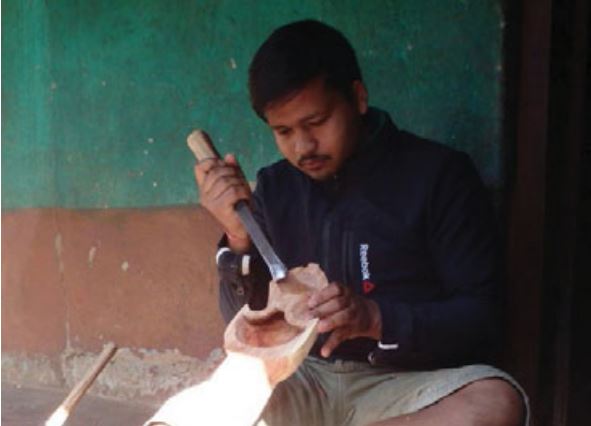Lockdown silences traditional music of Gandharbas
Kathmandu
Sanu Kanchha Gandharba has been playing sarangi since he was 12 years old. He followed his traditional profession, playing sarangi from village to village in Gorkha, Lamjung, Tanahun and Kaski. More than 30 years ago, he was drawn to Thamel and its tourists, and the prospect it offered to people like him, for livelihood.
Thamel is the hub for tourists in the Capital. Many Gandharbas, who are traditional musicians, like Sanu Kanchha had been playing sarangi for tourists on the streets and selling the instruments they make to earn their livelihood till the coronavirus pandemic hit and lockdown was clamped in the country on March 24. It has confined Sanu Kanchha to his home in New Baneshwore with “no work” as the source of his income has been shut off. “We were very hopeful,” says the 56-year-old adding, “It was the mid-season for tourist arrivals.”
The earning Thamel offered was “enough” for Sanu Kanchha’s livelihood who hails from Tanahun. But a little over two months into the lockdown, he is concerned about how he and his family will survive with no source of income.
Gandharbas are nomadic musicians. But some are showcasing their talent and selling instruments in tourist spots like Thamel, Pokhara and Sauraha in order to commercialise their profession, as per clinical music therapist and musician Kedar Gandhari, President of Sarangi Social Enterprises.
“Their livelihood is associated with tourism and the crisis of coronavirus has affected them badly as daily wagers,” he says. As such many of these musicians have returned to their villages and families in Gorkha, Lamjung and Tanahun.
As per sarangi player Anil Gandharba, General Secretary at Gandharba Cultural Art Organisation, as many as 22 musicians have returned to their villages out of 25 active members of the organisation who mostly play sarangi and sell the instruments (sarangi that they make) in Thamel. Only those who have a family in Kathmandu with them have remained here. Anil, who has band called Samundra and used to play in a restaurant in Thamel, returned to his village in Tanahun about a month ago. “We are musicians, and in the entertainment field people come to enjoy music if the economy is good and restaurants allow us to do gigs. Now that it is gone, our source of income has dried up completely and I felt it would be wise for me to return home,” he shares over the phone from Tanahun adding, “Staying in Kathmandu is purely for the profession and to generate income. I stayed there as a tenant. I have a house and family here in my village. Other Gandharbas too are in the same situation — Kathmandu is not home for most of them but a place to earn.”
The plight in the villages is no different. Narayan Gandhari and his wife Durga Devi Gandhari, who had gone to their village in Gorkha for a puja, got stuck there due to the lockdown. The couple who used to travel across villages and cities, but now mostly in Kathmandu playing sarangi are “out of work due to the lockdown” as per 58-year-old Narayan.
As they are looking to return to Kathmandu to their family, he shares they don’t know what the future holds.
Most Gandharbas don’t have an alternative work like agriculture to do in the villages. Anil shares, Gandharbhas of Tanahun, Lamjung and Chitwan are completely in the music profession and they don’t have much land to farm. “I have been visiting my neighbours — some of them are making sarangis but they don’t know where and to sell ,” he reveals.“The situation is tough for them,” he adds, “They don’t know what to do, we don’t know how long this will continue.”
People might not have jobs but “people shouldn’t die out of hunger,” Kedar feels.
So, he recently initiated a food camp. With the help from friends and families all over world, a team comprising members from Gandharba Cultural Art Organisation, Sarangi Social Enterprises and Gandharba Society Nepal is distributing food parcels of rice, daal, soap, salt and oil to Gandharba families across the country as well as other marginalised community, refugees, single women among others.
A version of this article appears in e-paper on May 28, 2020, of The Himalayan Times.






